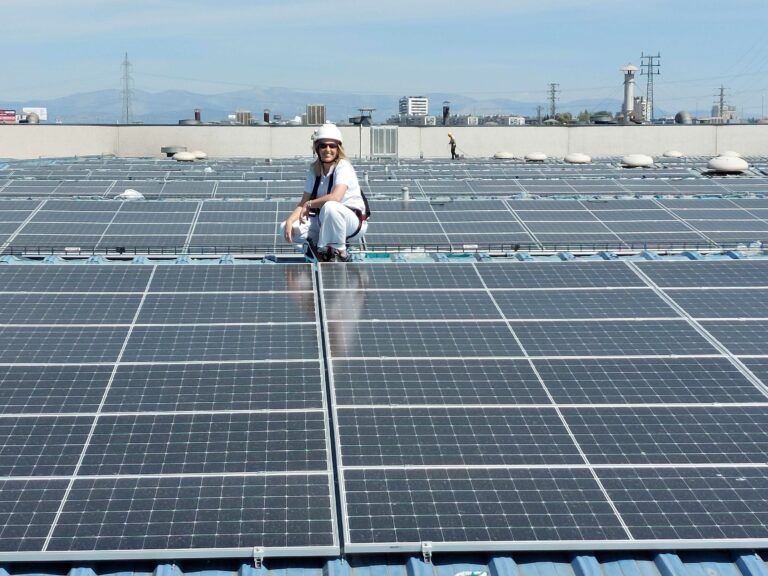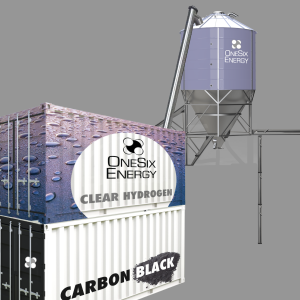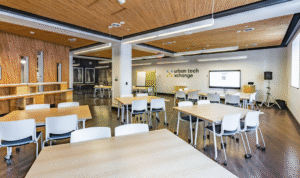
- Kim Kisner
- Business
- 02/27/2024
Focuses include Energy, Waste, Carbon, and Water Reduction

With over 19,000 employees working in 56 manufacturing, engineering, and technical centers in over 10 countries, Martinrea International is a global auto parts manufacturer focused on the design and development of lightweight structures and propulsion systems.
Its sustainability goal is to operate in a socially responsible and ethical manner centered around respect for the environment, laws, universal human rights, and communities around the world.
SBN Detroit spoke with Rachel Handbury, director of sustainability, to find out more about the company’s approach and execution.
Q: How do you approach sustainability at Martinrea?
A: Martinrea views sustainability as a holistic approach that encompasses both people and the planet. Our vision is to make lives better by being the best supplier we can be in the products we make and the services we provide. One of our ten guiding principles is to ultimately “leave It better.”
Q: How is sustainability organized internally?
A: There are a lot of different layers within Martinrea to achieve sustainability. It is embedded throughout the company from leadership to the manufacturing plants.
We have a Sustainability Steering Committee, and the group holds quarterly meetings. This is led by our CEO, and his presence in the meetings drives the importance.
We have a strong team working constantly on sustainability that meets weekly. This involves a sustainability lead from each of our four business units (Aluminum, Metallics, Flexible Manufacturing Group (FMG) and Fluids). We review each business unit’s sustainability targets, initiatives, and implementation. As you can imagine, each group drives their sustainability priorities slightly differently due to their different manufacturing processes.

Q: In around 2019/2020, Martinrea hired a third-party consultant to assist with the sustainability strategy. How did that work?
A: Martinrea utilized this consultant team to perform an internal materiality assessment, identify our stakeholders, and propose a sustainability strategy, which I was hired to manage. We then developed the business unit sustainability lead team and the Sustainability Steering Committee – the management structure needed to implement the sustainability strategy.
Q: How do you get employees involved in sustainability?
A: We do this in multiple ways. Education is key. The more our employees know about sustainability and how Martinrea supports sustainability, the more they want to incorporate it at work and in their homes.
The fact that our leadership is on board is very important. It’s embedded from the top down and vice versa.
Sustainability is also part of our internal business plan. We have implemented sustainability scorecards for the manufacturing plants and within each business unit, so everyone has clear sustainability targets they are looking to achieve.
We also give out an annual ‘Leave it Better’ award to a plant that is excelling in all aspects of sustainability. The purpose is both to highlight the work being done and to foster involvement. The added benefit is that the winning plant inspires others to do similar work in their plant.
Q: What are your short-term goals for 2024?
A: We have a year-over-year goal of a 3% reduction in energy intensity (energy consumption relative to sales) in all operations. We also have a year-over-year absolute carbon reduction goal of 3%. This year we added internal water reduction goals, and we are working to reduce water consumption focusing on the plants located in high-water risk areas and plants that have the highest water usage.
Q: What are your longer-term goals?
A: 35% reduction in absolute carbon by 2035 without carbon credits, and we strive for every manufacturing plant to be zero landfill.
Q: What are your biggest challenges?

A: We are a growing company, so as our production increases, we have to balance that with continuing to achieve our reduction goals.
Q: What are the biggest opportunities?
A: Sustainability is very important to our customers and communities. We are an authentic company achieving our sustainability goals through energy efficiency and giving back to the communities in which we work and live. Our approach to sustainability provides a competitive advantage since our customers want to work with sustainable suppliers.
Q: How are your suppliers vetted when it comes to sustainability?
A: Suppliers are a big focus for us right now. Just as our customers view us as partners in sustainability, we also view our suppliers as partners. We have sustainability embedded in our supplier assessments and our supplier code of conduct.
We are also providing more education to our suppliers so that they understand why it’s important to us and also to them. Some of our suppliers are in the early stages of sustainability and we can help to pull them along on this sustainability journey.
Q: In 2022, Martinrea set a goal to reduce carbon emissions by 35% by 2035. How will you get there?
A: It’s a multifaceted approach. But boiled down, we focus on reductions first. We need energy to produce parts, but we are looking at how we can use energy in the most efficient ways.
The next stage is to look at renewable energy. In one of our plants in Spain, we just installed solar panels that provide 10% of the plant’s energy.
Q: You have reduced carbon intensity by 19% since 2019 – how?
A: This same strategy. We start with low-hanging fruit. There were significant reductions made by switching lighting to LED, simple changes in welding techniques, and more. It’s really about having eyes on the manufacturing process through the lens of sustainability and making changes.
Q: What does the future look like?
A: Following the strategy we’ve developed to push sustainability further each year, we will be utilizing innovation to accomplish energy and waste reductions, increasing efficiency, and then incorporating renewable energy, where possible. At Martinrea, it’s not about making broad claims, it’s about being authentic and digging deeper to see where we can make a difference, both for people and the planet.
Be sure to subscribe to our newsletter for regular updates on sustainable business practices in and around Detroit.
Kim Kisner
- All
- Business
- Community
- Education
- Events

Eastern Market Partnership, in collaboration with the City of Detroit’s Office of Sustainability Urban Agriculture Division, has announced $240,000 in grant funding to support Detroit-based farmers and farmer collectives. The grants will advance food access, climate education, sustainable land use, and economic opportunity, with priority given to Black- and Indigenous-led farms, youth-led initiatives, and projects rooted in historically disinvested neighborhoods. The recipients – ranging from cooperatives and community...

Citizen Robotics is a Detroit-based nonprofit that advances the use of robotics and digital manufacturing in residential construction, focusing on improving productivity, sustainability, and long-term affordability. Best known for its early work in 3D-printed housing, it explores how alternative construction methods and new financial models can reduce material waste, lower lifetime operating costs, and enhance the resilience of homes. SBN Detroit interviewed Tom Woodman, founder and president of...

Detroit-based OneSix Energy is a clean-energy technology company focused on advancing a lower-carbon approach to hydrogen production. Headquartered at Newlab in Detroit, the startup is developing a proprietary methane pyrolysis system designed to produce hydrogen without carbon dioxide emissions, while also generating solid carbon as a co-product. SBN Detroit interviewed with cofounder Stefan Sysko about the company’s origins, its approach to hydrogen production, and why Detroit is positioned...







